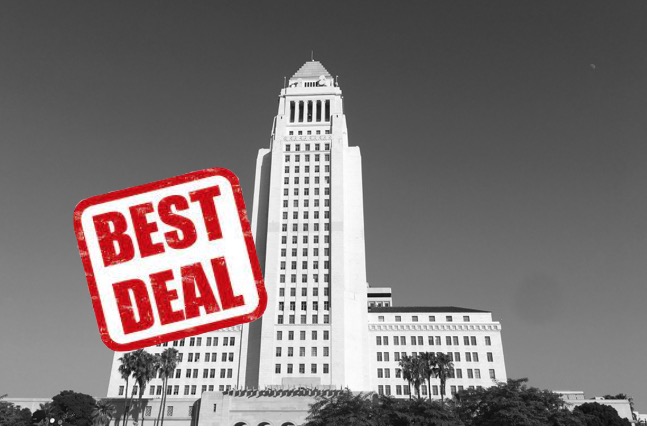CommentsGELFAND’S WORLD - There is a question that should be asked of all those candidates for mayor and for the City Council. It goes like this:
We notice that you have received an endorsement from the police officers' union or from a municipal employees' union. What deal did you make to get that endorsement? In particular, what commitments have you made to raise the salaries of city employees including its police officers? Alternatively, can you hold the line on salary increases for city employees including police officers?
This, I suggest, is the obvious and most important question to ask all those candidates.
Holding the line on salaries is the obvious way to begin to make headway against the ongoing structural deficit in city budgeting. By the way, that term "structural deficit" simply refers to the unwillingness of the political people to say No to their campaign donors. Otherwise, the rising revenue streams could have created a balanced budget that would also have money left over to repair and replace things that are needed.
A colleague rephrases the question: Tell us about the night you sold your soul to the devil and when did you stop killing your wives? It's a bit tongue in cheek, but it makes the point that giving in to the special interests -- in this case the municipal unions -- can do a lot of damage to the rest of us. You can either represent the interests of the people as a whole or you can do the bidding of the groups who paid for your campaign. You can't do both.
Previous generations of City Council representatives have made those deals, and the city shows the resulting scars.
What we have been hearing in those TV ads, and what it really means
When the candidate stares at you from the tv screen and says that he will not defund the police, consider what that statement really means. The question we need to ask isn't whether he will reduce the overall police budget, but whether he will fund extra police on the streets. Those are two different things.
Think about it -- by agreeing to salary increases for the police, the candidate is -- all other things being equal -- actually promising to reduce the number of police, because the total salary money won't go as far in terms of how many employees it covers. The only way to even hold the line on the number of police -- given those promised salary increases -- is to raise taxes.
This calculation isn't even at the level of freshman economics. It's simply the ability to multiply and divide. At a cost of $100,000 to put a cop on the street, how far does a billion dollars go? Now make it $120,000 and how many fewer cops does this provide? A sixth grader could do the math.
Notice, by the way, that the take home salary for a police officer or a city IT worker is not the only cost. There is the pension fund (clearly underfunded, as Jack Humphreville has shown so convincingly in these pages) and all the other costs of providing office space, equipment, parking, a police car, and of course benefits that go beyond straight salary. A list of the salary numbers can be found here.
We've been hearing all kinds of candidate promises about homelessness, crime, jobs, and even climate change, but let me suggest that a perpetually bankrupt city is the real issue and the press has been letting us down regarding that question.
To all the City of Los Angeles candidates out there -- what deals have you made regarding city employee salary increases, and what is the line you will draw on how high those increases go?
(Bob Gelfand writes on science, culture, and politics for CityWatch. He can be reached at [email protected])





